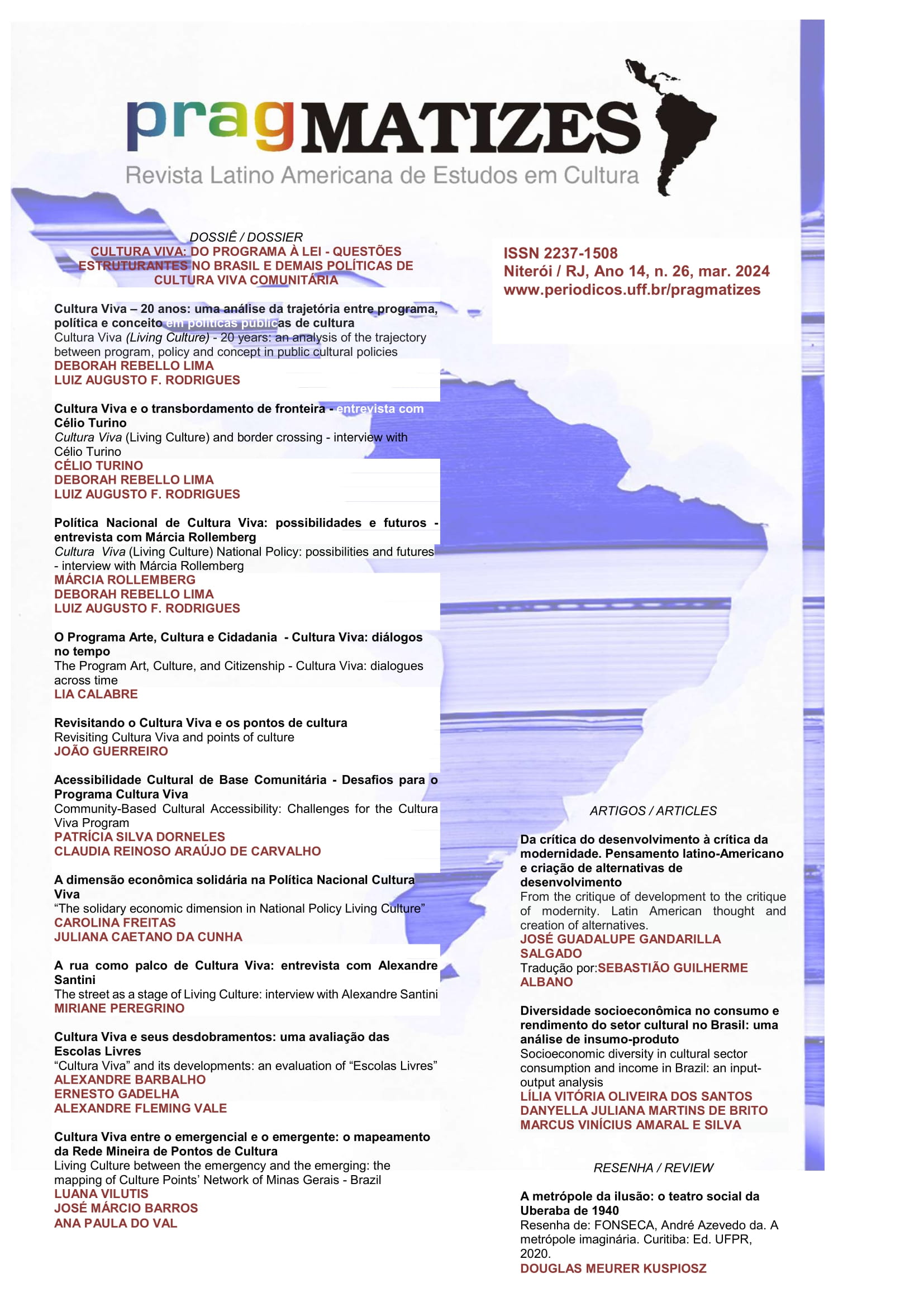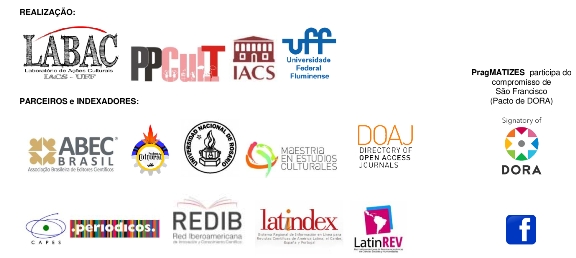Revisiting Cultura Viva and points of culture
DOI:
https://doi.org/10.22409/pragmatizes.v14i26.61238Keywords:
Living Culture, Ponts of Cultura, public cultural policiesAbstract
In this article I seek to reflect on the 10 years of the Living Culture Law and the 20 years of the Living Culture National Program. Starting from the debates about the creation of the Ministry of Culture, still at the end of the dictatorial regime in force between 1964 and 1985, I move on to discussions about public cultural policies that could be directed to community groups, peripheral groups and those outside the Rio-São Paulo axis even in the José Sarney government through a more comprehensive proposal to use the federal culture incentive law presented by the then minister Celso Furtado. I bring the debate about alternatives to direct and indirect promotion policies to the cultural field, seeking to demonstrate that the exclusionary nature of these policies is not unrelated to the conservative profile of the groups that privatize the Brazilian state. With this, I seek to demonstrate the innovative, inclusive and expanding role of this same state through the Cultura Viva (Living Culture) Program, without failing to point out the needs to improve the program, which, in 2014, becames a state policy. I conclude these considerations by pointing to the new challenges that are added to the very need to rebuild public policies as a whole, and cultural policies, in particular.
Downloads
References
BEZERRA, Jocasta; BARBALHO, Alexandre. As culturas populares nas políticas culturais: uma disputa de sentidos. PragMATIZES - Revista Latino-Americana de Estudos em Cultura, Niterói, ano 5, n. 8, p. 67-81, mar. 2015.
BOLAÑO, Cesar; MOTTA, Joanne; MOURA, Fabio. Leis de incentivo à cultura via renúncia fiscal no Brasil. In: CALABRE, Lia. Políticas culturais: pesquisa e formação. São Paulo, Itaú Cultural ; Rio de Janeiro, Fundação Casa de Rui Barbosa, 2012. p. 15 – 50.
BRASIL. Emenda constitucional nº 48, de 10 de agosto de 2005. Institui o Plano Nacional de Cultura.
BRASIL. Lei 13.018 de 22 de julho de 2014. Institui a Política Nacional de Cultura Viva. Brasília, 2014.
COSTA, Leonardo; ROCHA, Renata. Estudos em políticas culturais: passado, presente e futuro?. Extraprensa: cultura e comunicação na América Latina, São Paulo, v. 14, n. 2, p. 159-179, jan./jun. 2021.
COUTINHO, C. Notas sobre cidadania e modernidade. Revista Praia Vermelha, Rio de Janeiro, v. 1, n. 1, 1º semestre de 1997.
DAGNINO, Evelina. Sociedade civil, participação e cidadania: de que estamos falando? In: MATO, Daniel Mato (coord.), Políticas de ciudadania y sociedad civil en tiempos de globalizacion. Caracas: FACES, Universidad Central de Venezuela, 2004. p. 95-110.
FERRON, Fabio; ARRUDA, Maria A. do N. Cultura e política: a criação do Ministério da Cultura na redemocratização do Brasil. Tempo Social, revista de sociologia da USP, v. 31, n. 1, p. 173-193, jan.-abril 2019.
FGV/CPDOC. José Aparecido de Oliveira. Verbete. S/d, s/a. Disponível em: https://www18.fgv.br/cpdoc/acervo/dicionarios/verbete-biografico/jose-aparecido-de-oliveira. Acesso em: 15 out. 2023.
GIL, Gilberto. Discursos de posse do Ministro da Cultura Gilberto Gil. Brasília: Ministério da Cultura, 2003.
GRAMSCI, A. Cadernos do Cárcere: Intelectuais e a Organização da Cultura. São Paulo: Civilização Brasileira, 2000.
GUERREIRO, João. Política cultural de inserção social? BARBOSA, Frederico; CALABRE, Lia (orgs.). Pontos de cultura: olhares sobre o Programa Cultura Viva. Brasília: Ipea, 2011.
GUERREIRO, João. Quando o centro é a periferia: dinâmica cultural na região portuária do Rio de Janeiro. [Tese de Doutorado em Serviço Social] Universidade Federal do Rio de Janeiro, 2013.
LIMA, Deborah Rebello As teias de uma rede: [Mestrado em História, Política e Bens Culturais]. CPDOC-FGV, Rio de Janeiro, 2013.f
MARQUES, Douglas; GUERREIRO, João. Políticas culturais e o caso fluminense: sistemas de financiamento à cultura e seus divergentes desdobramentos no território fluminense. Anais XII Seminário Internacional de Políticas Culturais. Rio de Janeiro: Fundação Casa Rui Barbosa, 2023.
MAURO, V. F. Participação de indígenas Terena na resistência à emancipação da tutela durante a ditadura militar. Tellus, v. 19, n. 40, p. 73–102, 2019. Disponível em: https://doi.org/10.20435/tellus.v19i40.608. Acesso em: set. 2023.
MINISTÉRIO DA CULTURA. Programa Cultura Viva: análises e observações. Brasília, DF, 2009.
MINISTÉRIO DA CULTURA. Programa cultural para o desenvolvimento do Brasil. Brasília, DF, 2006.
MOURA, Carlos. 20 anos de história. Revista Palmares – cultura afro-brasileira, ano 4, n. 4, p. 8-15, 2008.
NASCIMENTO, Alfredo. Política cultural no Brasil: do estado ao mercado. Anais do III ENECULT - Encontro de Estudos Multidisciplinares em Cultura. Salvador: UFBA, 2007.
OLIVEIRA, Lucia Lippi. Cultura é patrimônio: um guia. Rio de Janeiro: Ed. FGV, 2008.
RUBIM, Antonio. Políticas culturais no Brasil: tristes tradições e enormes desafios. In: RUBIM, Antonio; BARBALHO, Alexandre (orgs.) Políticas culturais no Brasil. Salvador: EDUFBA, 2007. p. 11-36.
RUBIM, Antonio. Políticas culturais no primeiro governo Dilma: patamar rebaixado. In: RUBIM, Antonio; BARBALHO, Alexandre; CALABRE, Lia (orgs.). Políticas culturais no governo Dilma. Salvador: EDUFBA, 2015.
SANTINI, Alexandre. Cultura Viva comunitária: políticas culturais no Brasil e América Latina. Rio de Janeiro: ANF Produções, 2017.
SANTOS, Milton. A natureza do espaço. Técnica e tempo. Razão e emoção. São Paulo: Hucitec, 1997.
SARCOVAS, Yacoff. O incentivo fiscal no Brasil. Revista D’Art, n.12, p. 22-28, 2005.
TURINO, C. Cultura Viva, 2006. Disponível em: http://www.cultura.gov.br/cultura_viva/?page_id=9. Acesso em: ago. 2009.
TURINO, Célio. Ponto de cultura: o Brasil de baixo para cima. São Paulo: Anita Garibaldi, 2009
TURINO, Celio. Por uma cultura viva desescondendo o Brasil profundo. Revista Rio de Janeiro, n. 15, p. 135–139, jan.-abr. 2005.
Published
Versions
- 2024-09-05 (2)
- 2024-09-04 (1)
How to Cite
Issue
Section
License

This work is licensed under a Creative Commons Attribution 4.0 International License.
By forwarding an original to PragMATIZES, the authors agree that the copyright related to it is transferred to the Publishing. Articles and other writings are made available in PDF format from their publication, and they can be downloaded to institutional repositories and personal pages, provided that with their proper bibliographic indication.



